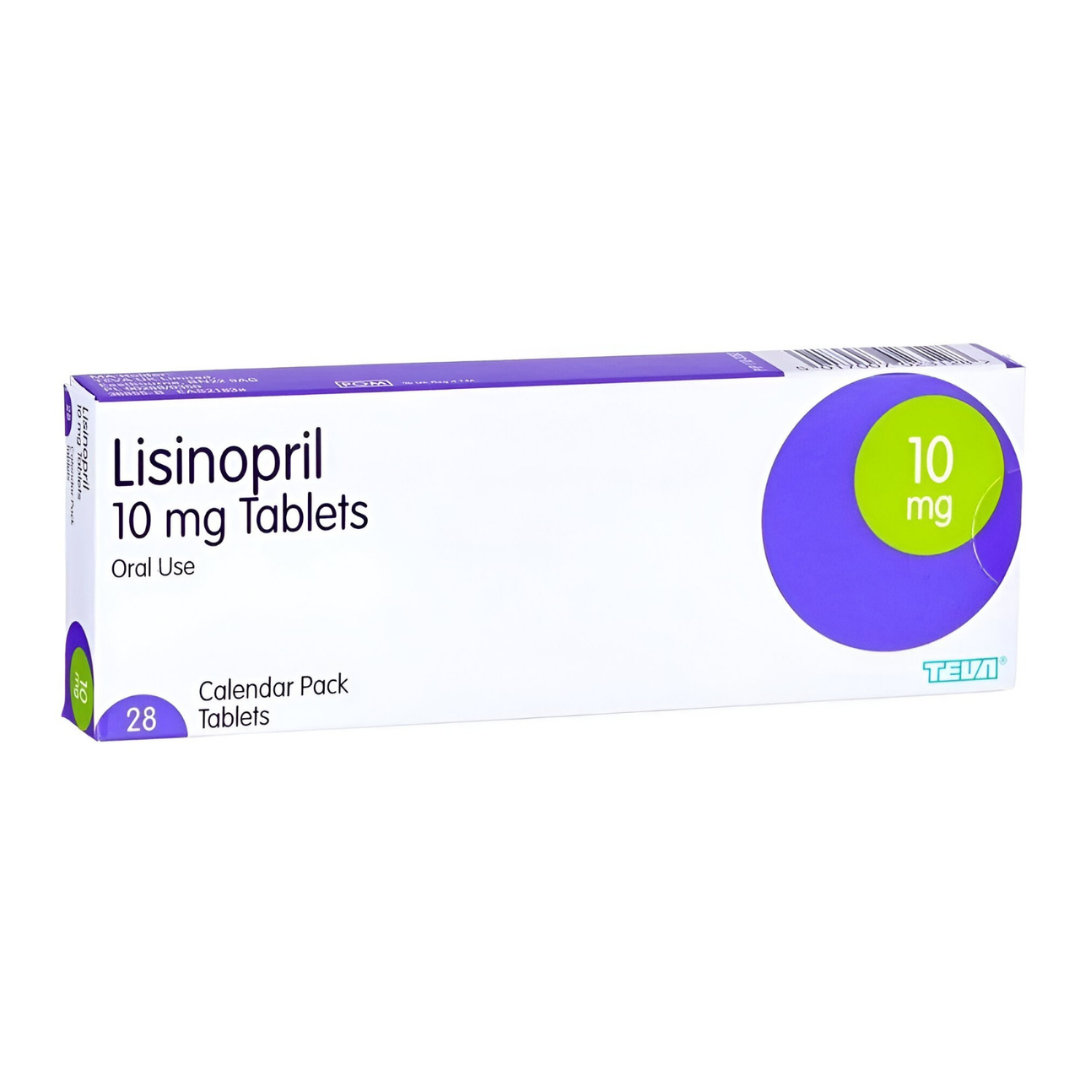- Your cart is empty
- Continue Shopping
Lisinopril 10mg : Dosage & Benefits

Lisinopril 10mg: The COVID-19 epidemic has brought attention to lisinopril, a drug that is frequently recommended to treat heart failure and high blood pressure.
Patients using lisinopril frequently have concerns about the drug’s efficacy and safety, especially in light of COVID-19, as the world struggles with the virus’s consequences.
The purpose of this blog is to examine the connection between COVID-19 and lisinopril, with an emphasis on side effects, issues related to dosage, and the general health consequences on patients.
Knowledge : Lisinopril 10mg
An inhibitor of the angiotensin-converting enzyme (ACE) is lisinopril. It functions by blocking the production of the hormone angiotensin II, which causes blood vessels to narrow.
Lisinopril lowers blood pressure and improves heart blood flow by inhibiting this hormone,
which also helps relax blood arteries. It is often used for heart failure, hypertension, and to
lower the chance of developing new cardiac issues following a heart attack.
Applications of the Drug:
The Drug lisinopril is prescribed for:
High Blood Pressure:
Reducing blood pressure can help avoid kidney issues, heart attacks, and strokes.
Heart Failure:
Helps stop the condition from getting worse and helps alleviate symptoms in patients.
Care After Heart Attack:
Lisinopril can lower the risk of further cardiac events and increase the rate of survival
following a heart attack.
Dosage of the Drug
There exist multiple dosages of lisinopril, with 10 mg being a typical initial dose. The
recommended daily dosage, which can range from 5 mg to 40 mg, can be changed
depending on the patient’s response and health.
Lisinopril and COVID-19:
ACE drugs ( angiotensin-converting enzyme ), such as lisinopril, have drawn attention from
researchers studying the effects of the virus on COVID-19-infected patients.
In order to enter human cells, the SARS-CoV-2 virus binds to ACE2. ACE inhibitors may raise the body’s ACE2 levels, which may alter the virus’s behavior, according to certain research findings.
Diverse Research Results
There have been conflicting findings in the literature about lisinopril and COVID-19.
According to certain research, those using ACE ( angiotensin-converting enzyme ) inhibitors
such as lisinopril had a decreased chance of getting the virus or experiencing severe symptoms.
Nevertheless, some research has shown concerns that elevated ACE2 levels may
increase the risk of severe illness and lengthen hospital admissions for COVID-19 patients.
Decreased Chance of Contamination
According to certain research, ACE inhibitors ( angiotensin-converting enzyme ) may
improve heart and lung function by modifying the renin-angiotensin system, which may
lower the incidence of severe COVID-19 cases in patients.
Increased risk of hospitalization
Data suggests that individuals who are severely ill may not benefit from ACE inhibitors; in
fact, several research suggest that starting such therapies during a COVID-19 hospital stay
increases the risk of serious consequences.
Experiments in Clinical Practice and Monitoring
Knowing the effects of using lisinopril during the pandemic has been made possible by both
clinical trials and observational studies:
Gainful Results
Lisinopril users did not exhibit a higher risk of severe COVID-19 outcomes in comparison to
those who did not take ACE inhibitor drugs, according to several research.
Negative Results:
Restarting ACE inhibitor medication in critically ill COVID-19 patients may worsen their
clinical results, according to several trials.
Possible Lisinopril Adverse Effects
A worldwide pandemic makes it especially important to be aware of any possible adverse
effects, even if lisinopril can be very helpful in controlling blood pressure and cardiac
conditions:
Frequent Adverse Reactions: Lisinopril 10mg
Heavy Headache or Vertigo
Particularly while titrating up or initiating the drug
Fatigue
Taken in conjunction with Lisinopril, fatigue may strike certain persons.
Dry Cough
One of the most common potential adverse effects of ACE inhibitors is a chronically dry
cough.
Adverse Reactions
A few less frequent but potentially dangerous adverse effects are:
Angioedema
Deep skin layer swelling, which is a potentially fatal response.
Kidney Damage
Renal health should be closely monitored because lisinopril may have an impact on it.
Liver Damage
Among the symptoms include black urine, nausea, and jaundice (skin yellowing).
In case of any severe side effects or symptoms suggesting potential consequences, patients
ought to get in touch with their healthcare professional.

Patients with Hypertension and COVID-19
COVID-19 and Hypertension – Risk Factors An increased risk of severe COVID-19 outcomes has been demonstrated in patients with hypertension.
Following are the reasons that lead to the relationship:
Fundamental Health Problems
In addition to increased risks during the illness, uncontrolled hypertensive individuals may
also have secondary consequences like diabetes or heart disease.
Immune Reaction
It may be more difficult for the body to fight against infections if hypertension affects the
immune system.
Blood Pressure Management
When the COVID-19 pandemic strikes, blood pressure control becomes even more important
for those who already have hypertension.
If compromised, better results can be achieved by effective management:
Consistent observation
Taking prescription drugs like lisinopril as directed is crucial, as are routine blood pressure
checks.
Advising medical professionals
Patients who notice any changes in their symptoms or have any questions about their
medicine should speak with their healthcare provider.
Conclusion: Lisinopril 10mg
Research and clinical interest in the correlation between lisinopril and COVID-19 are still
high. Lisinopril is a vital drug for treating hypertension and related disorders, although
opinions regarding its effects during the COVID-19 pandemic have differed.
The available research points to both potential advantages and disadvantages of using it in hypertension patients.
If you use lisinopril or any other ACE inhibitor, it’s important to be in constant
contact with your doctor, take your medication as directed, and keep an eye out for any
changes in your health.
Patients will be better equipped to decide on their course of therapy and care as long as the medical community keeps researching the effects of ACE inhibitors in relation to COVID-19.
FAQ: Lisinopril 10mg
1. How long is the COVID-19 pandemic safe to continue taking lisinopril?
Unless your doctor instructs you differently, you can safely continue taking lisinopril.
2. Lisinopril exacerbate the symptoms of COVID-19?
Variations exist in research findings. Studies on critically ill individuals reveal possible dangers, while others show no increased risk.
3. Should I stop taking Lisinopril if I get COVID-19?
As quitting the drug could result in major consequences, never stop taking lisinopril without first speaking with your doctor.
4. What should I do if I experience side effects from Lisinopril?
Swelling, coughing, or dizziness are examples of negative effects. See your doctor for
advice if any of these occur. To guarantee safe usage, regular monitoring is necessary.
5. How can I manage my blood pressure during the pandemic?
To properly manage your blood pressure, keep up a healthy lifestyle, take your medications as prescribed, and make regular appointments with your healthcare practitioner.
6. How hypertension becomes a significant risk factor for severe COVID-19?
According to studies, those who have high blood pressure are more likely to experience severe COVID-19 symptoms and problems. It’s critical to control blood pressure effectively.
Shop Now: Lisinopril 10mg

